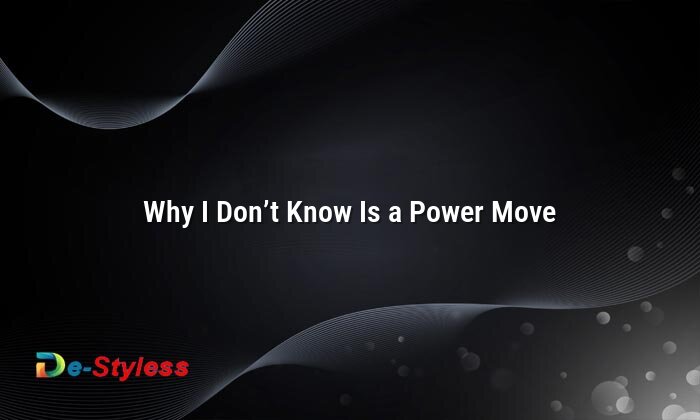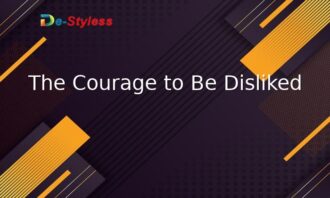In a world where certainty is often valued and where the pressure to have all the answers is overwhelming, admitting “I don’t know” might seem like a sign of weakness. It can be difficult to acknowledge uncertainty, especially in professional or social settings where expectations are high. However, embracing the phrase “I don’t know” can actually be a powerful move. It shows humility, openness, and a willingness to learn—qualities that are often more valuable than pretending to know everything.
In this article, we will explore why saying “I don’t know” is not a sign of inadequacy, but rather a display of strength and confidence. By examining how this simple phrase can positively impact personal growth, professional development, and interpersonal relationships, we can redefine our understanding of knowledge and confidence.
The Power of Vulnerability
Admitting that you don’t know something may feel uncomfortable, but it is actually an act of vulnerability. Vulnerability is often viewed as a weakness in many cultures, but in reality, it takes great strength to acknowledge limitations. By saying “I don’t know,” you’re showing that you have the courage to admit that you are not infallible.
This kind of openness fosters trust. When others see that you are willing to acknowledge what you don’t know, they are more likely to trust you and feel that you are genuine. People appreciate honesty, and being upfront about your uncertainties can lead to stronger, more authentic connections, both personally and professionally.
1. Fostering Trust and Authenticity
When you admit to not knowing something, it humanizes you in the eyes of others. Instead of projecting a false sense of infallibility, you open the door to deeper, more meaningful conversations. This transparency can break down barriers, leading to a more collaborative and supportive environment. People are more inclined to respect someone who is authentic and real about their limitations.
2. Creating Opportunities for Learning
“I don’t know” is not an end; it’s an invitation to explore. It opens the door to new opportunities for learning and growth. Rather than being stuck in a place of pretending or avoiding certain topics, admitting ignorance allows you to seek out the knowledge and expertise you need. It shows that you are willing to take the necessary steps to fill in the gaps in your understanding, which is crucial for personal and professional development.
Shifting from Ego to Growth Mindset
One of the key reasons why “I don’t know” is a power move is because it aligns with a growth mindset. A growth mindset is the belief that intelligence and abilities are not fixed traits but can be developed through dedication and hard work. People with a growth mindset embrace challenges and view failure or gaps in knowledge as opportunities to improve.
Admitting ignorance is the first step toward learning and growing. People who are constantly striving to appear knowledgeable or perfect are often trapped in a fixed mindset. They avoid situations where they might look incompetent or make mistakes. In contrast, those who can openly admit they don’t know something are more likely to succeed in the long run because they are open to feedback, new information, and continuous self-improvement.
1. Embracing Curiosity
When you admit that you don’t know something, you are signaling that you are curious and willing to learn. Curiosity is a powerful tool for personal and professional development. It drives innovation, problem-solving, and creativity. By embracing curiosity and allowing yourself the space to not know, you foster an environment where ideas can be exchanged, and growth can flourish.
2. Turning Setbacks into Opportunities
Saying “I don’t know” is not a failure; it’s an opportunity to take control of your learning process. Every time you admit you don’t know something, you take the first step toward finding the solution. This mindset transforms setbacks into opportunities for progress, allowing you to view challenges as stepping stones toward greater understanding and achievement.
The Benefits in the Workplace
In a professional setting, leaders and employees alike often feel the pressure to have all the answers. The fear of being perceived as unknowledgeable can prevent individuals from asking questions or seeking help when needed. However, when someone in a leadership position admits, “I don’t know,” it can have a profound positive effect on their team.
Leaders who show vulnerability by acknowledging their limitations create an atmosphere where team members feel comfortable doing the same. This fosters a culture of openness and collaboration. It also encourages others to step up and contribute their ideas or expertise, creating a more dynamic and innovative environment.
1. Encouraging Team Collaboration
When leaders say “I don’t know,” it encourages a culture of collaboration. Instead of one person holding all the answers, the team can work together to find solutions. This approach not only strengthens the team but also enhances problem-solving and innovation. The collective intelligence of a group can often outperform individual knowledge, making collaboration a powerful tool in achieving success.
2. Building a Supportive Work Environment
Leaders who admit their lack of knowledge create a more supportive work environment where employees feel safe to share their own uncertainties. This helps reduce stress, fosters creativity, and increases job satisfaction. In such an environment, employees are more likely to take risks, offer new ideas, and contribute to the overall success of the team.
Overcoming the Fear of Appearing Uninformed
One of the primary reasons why many people avoid saying “I don’t know” is the fear of being judged or seen as incompetent. This fear is often rooted in societal pressures and unrealistic expectations about knowledge. However, the truth is that no one can know everything, and pretending to know something when you don’t only leads to confusion, mistakes, and missed opportunities.
By shifting the perspective from fear to empowerment, we can embrace the idea that it’s okay not to have all the answers. In fact, it’s often better to acknowledge ignorance than to bluff your way through a situation. In doing so, we gain credibility, show our commitment to growth, and ultimately become more knowledgeable in the process.
1. Building Credibility Through Honesty
While it may seem counterintuitive, admitting “I don’t know” can actually enhance your credibility. People respect individuals who are honest and transparent. By openly admitting your limitations, you demonstrate self-awareness and a willingness to learn. This builds trust with others and encourages them to support you in your efforts to gain knowledge.
2. Empowering Others to Speak Up
When you, as a leader or peer, admit that you don’t know something, it gives others permission to do the same. This creates a safe space for open dialogue, where people are more likely to speak up, share ideas, and ask for help when needed. It promotes a culture of mutual respect and knowledge-sharing, which is essential for growth and success.
Conclusion
In conclusion, “I don’t know” is far more than just a simple admission of ignorance; it is a powerful tool for growth, learning, and collaboration. By embracing this phrase, individuals can break free from the fear of appearing uninformed and instead foster an environment of curiosity, trust, and openness. In both personal and professional contexts, admitting that you don’t know something can lead to stronger relationships, greater opportunities for development, and a more innovative approach to problem-solving.
Rather than seeing uncertainty as a weakness, we should recognize it as an opportunity for growth and learning. The true power of “I don’t know” lies not in the admission itself, but in the willingness to seek knowledge, improve oneself, and empower others to do the same.
Glossary
- Vulnerability: The state of being open to emotional risk or exposure, often linked to acknowledging one’s weaknesses.
- Growth Mindset: The belief that abilities and intelligence can be developed through dedication and hard work.
- Curiosity: A strong desire to learn or know something, often driving personal and professional growth.
- Collaboration: The process of working together with others to achieve a common goal.
- Credibility: The quality of being trusted or believed in, often built through honesty and integrity.





